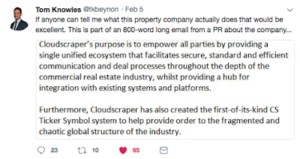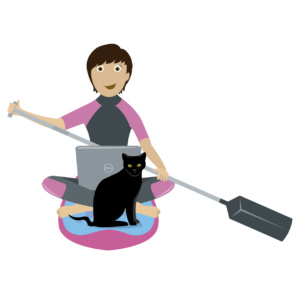On K.I.S.S.ING – Keeping it simple, stupid!
Time to read: 2 minutes
We keep it brief.
We saw this tweet from Tom Knowles a few weeks ago, And it stayed with us. We see this type of thing all the time. Paragraphs beyond paragraphs of long clunky words with no clear explanation as to what it is they are trying to say. You can spend what seems like an age watching a company description going around the various the heads and powers that be of a company. We know this as we’ve worked in-house too. Everyone wants to add their own point of view, something that makes them feel that they played a part in the creation of the copy. But in doing so, adding a long word here and a bit of jargon there, we can completely lose all sense of what we’re trying to say.
When you work for a company you can get so immersed in it and the technicalities around how it works that to come up with a simple sentence to describe what it does exactly can be the hardest thing. We see this a lot in PR too. When we ask a company for 800-1000 word article on a chosen subject its easy. When we ask for a two-sentence reactive comment, it seems to take all day. And it’s the same for us too. For some reason writing less always takes more.
Let’s take the example above with Tom Knowles. Tom is the property reporter at The Times so we can assume that this is a property company (if the PR has got the pitch right!) but what they actually do is anyone’s guess.
Tom’s a busy man. He needs to sift through hundreds if not thousands of emails every day looking for the best news stories all while writing insightful copy for tomorrow’s paper under tight deadlines. He doesn’t have time to read 800 word emails. Tom needs to understand clearly from the outset why this company is great and unique and why it is that he should be speaking to them.
Think about how you read a news article or blog. If you read the first 100 words and you’re either a) not interested or b) you can’t see where it is going, then you are going to switch off and move on to something else. It’s the same with PR pitches. You’ve got to be succinct right from the start and make it very clear why your client is so interesting.
We’ve often questioned if our pitches to journalists can at times be too simplistic. We go back through them trying to add in fancy adjectives and make things sound perhaps more revolutionary than they actually are. What our clients are paying us to do is make sure that the journalist understands why they are so great and why we think it will make a good story. Translating this 800 word description in to two or three easily digestible sentences that get the journalist interested and want to find out more.
So next time you’re thinking about your ‘story’ find the three things that you think make it unique and interesting and express these points high up in your pitch. If you can capture the journalist’s attention in the first two sentences, then that’s half the battle won. If you’re not entirely sure what these key messages are, then it’s time to go back to the drawing board and start the process again.
You don’t need to give the journalist a life story about the company and the 30-year career of the chairman
Keep it brief. If the journalist is interested in the story that you are pitching then they will come back to you with questions. Keep it clear, to the point and highlight why it’s interesting in a couple of short sentences. Keep it simple.
How to get the best out of your virtual agency
Time to read: 2 minutes
OK so she does get out of bed for somewhat less then £10k, but Comms Crowd content writer Sandra Vogel, sets out her terms for keeping us all singing from the same song sheet…
Over the years I’ve been commissioned by some of the biggest names in Tech, national newspapers, and some of the best known technology web sites. I’ve also worked with lots of small companies, mostly but not all with a technology angle, with voluntary organisations, and with communications agencies. I’ve found good and bad clients across the spectrum. It’s not the size or sector that matters – it’s the approach and attitude of the client to using freelancers.The good clients value, support and nurture their freelancers, and in particular they get three very important things right.
Respecting my time. If I say I don’t work Friday afternoons and weekends, although i may make the odd exception, don’t expect me to be free to work as a matter of course. Similarly, if I am set to work for you, say, Mondays and Wednesdays, then if you need to change the day please give me lead time. In return I’ll only change our fixed days if it’s impossible not to, and I’ll give you as much lead time as I possibly can.
Keeping me in the loop. If I’m contracted to work on a specific project, then knowing what’s going on with that project is helpful. Rather than just being asked, ‘please do A, B and C this week’, it can be useful to know how A, B and C fit into the bigger picture and what others are working on. I appreciate that if I’m not in the office full time stuff will happen without me. Of course it will. But it’s useful to be briefed on the bigger picture, not just because it makes me feel like one of the team (it does, it really does), but because I can take wider points into account in my work. Even extra-busy clients that fall into my ‘love to work with’ group manage this.
Paying on time, and at the agreed rate. It should be unnecessary to make this point, but sadly it’s not. Renegotiating rates downwards during a contract or paying late are simply not on. Freelancers are working for a living. They are not volunteers. Trust me, you’ll soon get called out, word will get around. In exchange for paying on time I will deliver on time. And if there’s a chance I’ll be unable to do that, I’ll let you know well in advance.
Now, there’s circularity in this. You treat me well, I’ll treat you well. We’ll have a grown up, professional relationship that we will both enjoy. Heck, I might even work for you on a Friday afternoon. Now and then.
The seventh year – renewing her vows
Time to read: 1 minute
It’s seven years this month since Sam Howard walked away from the big West End PR agency to set up office in her dining room, buy a domain name, and a dog.
 |
| You got you a seven-year itch goin’ on? |
In that time working life has evolved from lone PR, to freelance collaborator, to creating a collective and now to running our (cloud-based) PR agency that continues to grow at around 25% a year.
So what does the seventh year herald? Am I going to get itchy feet and chuck it all in to become a landscape gardener, a masseuse or apply for Bake-Off? Or should I consider taking a back seat and let the team take the strain?
I think not. After seven years of being my own boss I still love the buzz of running a business and the challenges our kind of work brings. Still love my team and nearly all of our clients, nearly all of the time. I get a huge thrill when a campaign goes well, and I feel the pain if ever it doesn’t. I am alive to it.
Although I get to take a fair few holidays, I never have the blues on my return, and Monday mornings are much of a muchness to me. Among all my friends I never have one moment of work envy, not even when they are essentially paid to get plastered at Ascot under some vague notion of corporate hospitality. They are welcome to it – it’s small recompense for those inhuman early morning commutes, petty office politics and stingy levels of annual leave.
As for taking a back seat now that we are way up and running… Our clients have bought into the whole team and while there is no ‘I’ in team there is a ‘me’. We’re not going to become one of those agencies where you only see the founder on pitch day. Instead we’ll keep our growth to manageable proportions so we can continue to be an all-in kind of crew, as therein is where the happiness lies.
Turns out for me a seven year anniversary is less about an itch more an affirmation of vows.
A PR degree – is it REALLY worth it?

Time to read: 2 minutes
As our junior’s three year PR degree draws to an end and the student loan looms large, she asks: Was it really worth it?
Ultimately only time will tell (although I would
like to think YES) as I am yet to graduate and secure a job in the industry.
However, I can still look back on my time studying PR at UAL and pick out the positves and negatives.
Firstly, I do think studying in London brings such an advantage to any student, particularly a PR student, as your University is located on the door step of some of the biggest PR agencies in the UK. Additionally, my Uni has fantastic connections with a variety of PR professionals, with completely differing backgrounds.
Consequently, every week we received a guest lecture from somebody different,
who would provide us with an insight of their experience in the PR industry and
offer advice to those wanting to take a similar path. For me this has been one
of the highlights of my PR degree experience. The talks have opened my eyes to the different paths, sectors and opportunities working in the industry has to offer.
The opportunity the university provides to being exposed to different PR professionals gives you the ability to be proactive and make connections. In
my case, if it wasn’t for Sam being one of my guest lecturers in my second year, I wouldn’t have landed an internship at the tech PR agency Hotwire in the summer of 2017. This then led to me landing my role as a junior for The Comms Crowd.
However, if I am being completely honest, if someone was to say to me do you
think a PR degree is worth it, I would struggle to definitely say yes. This is simply because I feel as though the duration of three years is far too long for the work that you do. In addition to this, obviously this differs depending on where you study, however my course has been primarily theory based. It has been interesting to unveil the theories and history behind PR, although I feel it could be argued whether it is necessary to have this knowledge to succeed in the PR industry.
So although I have obtained a great deal from studying a PR degree, I do feel three years is too long and nor do I believe it is essential if you want to go into the industry. In my experience, PR internships are not too hard to come across, once you
have gained the necessary experience from carrying them out. If you are hard
working, passionate and approachable it is possible to secure a role in PR without a PR degree.
Top five mistakes to avoid when pitching your freelance services
Time to read: 1 minute
Sam Howard dispenses some sage advice to would-be freelancers. Or, how to pitch a pitcher…

The Comms Crowd has been growing recently our little team has just about hit double figures and what a fab little team we are. I knew from the get go when each person got in touch that they would be a great fit for us, our culture and our clients.
But over the years I have been contacted by quite a few individuals hoping to join the gang and not all of them made such a brilliant first impression.
Here’s my top five mistakes to avoid when pitching your freelance services:
1) Telling me (in some detail) how much you hate your 9 – 5. Firstly I’m not that interested, secondly we don’t do negativity in pitches EVER, thirdly it demonstrates no commitment to freelance.
2) Telling me how (in more detail) you can’t get any real work and you’re desperate. Freelancing is real work and desperation doesn’t smell so good.
3) Clearly not understanding what we do, who we are and who we work for. We are B2B tech ergo if you are not B2B tech it’s not a good fit, honestly. Sending me some vanilla pitch about my ‘organisation’ has me lost at organisation.
4) Not demonstrating you have the four core skills: client management, content production, media or analyst relations, social media management. The rest is neither here nor there. And by demonstrating I mean send me a link to something you’ve written, send me coverage, show me a channel that you run…
5) Taking too long to tell me anything at all – this is a pitch right?
Truly if you can’t pitch yourself, how in the hell you gonna pitch our clients? (Can I get an Amen?)
Meanwhile, succinct, compelling and personable pitches that demonstrate your commitment to the freelance faith, map well to the Comms Crowd and showcase your in-demand skills will just have me dashing for that welcome mat.
Are you emotionally suited to be a freelancer?
Time to read: 3 minutes
Our new content creator, and sax enthusiast, Sandra Vogel looks at the attributes you need to sustain a freelance life.

they may not look like self starters, but when that postman comes…
Freelancing doesn’t suit everybody, but it sure suits me. I’ve been freelance for 20 years, and I can’t imagine working any other way. But it’s not for everyone. You know those buzzwords – highly motivated, self-starter, flexible attitude. Well, they apply to freelancing bigtime.
Highly motivated. Um – yep. Motivated to sit at the computer when the sun is out, the sky is blue, there’s not a cloud to spoil the view, and yet there’s a deadline to meet, a client call to take, and a couple of pitches to get in before you can even think of heading out that door. Well, that’s one way of looking at ‘highly motivated’. And there are times when it most certainly applies.
But there are other ways to look at motivation. I’m motivated to make as much as I can of the free time I have. That means that there are times when I can – and do – drop everything and get outside on a weekday to have some fun. The trick is keeping that motivation in line with working. Now that does take a certain personality type. It’s the type who can manage their time well, not over-filling it, not being too ambitious about what can be achieved in a given couple of hours, and making sure that time is allocated to fun as well as to work.
If that means being motivated to work on a Saturday morning in order to free up a Thursday afternoon, so be it.
Self-starter. People often see this as synonymous with the motivational thing, but in fact it is different. A self-starter just gets on with stuff. They’re the opposite of the procrastinator who always looks for reasons NOT to do things. The procrastinator says ‘Oh, I won’t write this blog today, because I’ve got a slot in the diary tomorrow’. The self-starter says ‘if I write this blog today then that diary slot tomorrow will stay free, and I can do something fun in that time.’
The self-starter has initiative and they make things happen. Importantly they don’t walk away when things get difficult. That’s a really important personality trait for anyone who wants to freelance. There’s no manager sitting nearby to provide feedback that you’re doing OK, or give pointers if you’re not doing OK. You just have to figure it out.
Being a self-starter shows itself in all kinds of things, not just hunkering down to tasks that are in the diary. It also applies to bigger picture stuff like hunting down new potential clients, following up possible work leads, even having a view of the universe and where you want to be in it – then working out how to get there.
But being a self starter also means doing things that might not feel very exciting, but that nobody else can do for you. There’s nobody around me to say ‘Sandra, I think it’s time you filed your tax return and updated your CV’. But when these things have to be done, they have to be done.
Flexible attitude. I’d say this is a vital attribute for any freelancer. I’m a pretty controlled kind of person. I like checklists, and I like to have things planned out. Most days I sit down to work knowing what’s going to happen during the day. I like to have my week planned out to a fairly fine degree too. Fridays are importantly different from the other days of the week. I don’t like having meetings on a Friday and I usually have no work at all scheduled after noon. The last work thing I do on a Friday is plan the following week.
How is that flexible? Well, while the aim is to take Friday afternoon off, it’s also ‘available’. So, Friday afternoon is a bucket that work can slip into if necessary. It might slip into the bucket because schedules have overrun, because a client has come up with something for me to do on a short deadline, or because Wednesday afternoon was beautiful and I went out for a bike ride, pushing everything in the diary ahead half a day.
One of the companions to having a flexible attitude is being relaxed and able to handle stress. A freelancer has to be good at that. There are often multiple demands on my time, and only I can decide the best way to resolve them. So, when two clients want something done right now and I have to negotiate a way through that, I need to be calm and considered. When my computer decides to give up working and I’ve not got a spare around, I just have to handle it. When something comes up that takes me away from work unexpectedly, I need to be able to handle both the work and the out of work situation equally well.
Like I said at the start freelancing isn’t for everyone. But if the cap does fit, it’s a great way to make a living. I’ve worked with some wonderful people (and my current Comms Crowd colleagues are among the best of all), done work I’ve really enjoyed, and spent more weekday afternoons in the cinema than I probably have a right to. What’s not to like?
The biggest mistake junior PRs can make

Time to read: 1 minute
I was recently interviewed for MK’s award winning PR blog. I taught Marcel at Westminster Uni where Ihe graduated with a distinction and he was also our junior for a year. In his #4PRQs series he asks a range of industry types the same four questions. The one I found most interesting was:
What is the biggest mistake of junior PR people you employ, and how can it be fixed?
And this is my expanded answer:The biggest mistake even the best junior makes, is trying to appear you are on it when you are not… saying you understand what you are doing when you don’t, not quite. I get the motivation – need to look like you are on it, don’t want to ask daft questions.
But we know coming into an agency life from an academic background is a huge shock: not least the speed in which things move:
- Agencies are always very fast, very busy and er slightly stressed and everyone apart from the new junior knows exactly what they are doing.
- The level of multi-tasking expected is unprecedented, it’s not unusual for a junior to sit across five or six accounts or even more.
- Being cc’d on every mail on every account sounds great right? you finally get to see what’s really going on. But believe me. it’s a high price to pay for wading through 200 mails a day, and where are you supposed to put them when you’ve read them? Are they all important??
So it’s no wonder juniors are over-whelmed from day one. But without complete understanding of what you are doing and why, even ‘simple’ tasks like updating media lists, or sourcing twitter feed content goes awry as the junior lacks the confidence to speak up and clarify any questions, resulting in frustration and lack of faith all around. Much better to fess up at the beginning and claim ignorance, especially in my sectors where the subject matter is deep. I mean how is a junior supposed to be all over AI, blockchain, machine learning, crypto currencies – etc? We really don’t expect you to get it straight away anyway, so you just speak up and ask those ‘stupid questions’.
one year on…hindsight advice for Freelancers-to-be
Time to read: 2 minutes
Simona Cotta Ramusino shares lessons learned from her first year as a freelance PR and digital marketing consultant:
So it’s already been a year since I took the plunge into freelancing and it’s certainly been a crazy, scary, and self-rewarding time for me. As the summer approached, I remember starting off tentatively, double-double-double checking every email I was about to send out and running every action past Sam. But after a few weeks I found my feet …and my voice. As I started working with different clients and different accounts, I rediscovered the real me, a more confident “me” who could take an active role in new prospects’ meetings, could produce good writing, and could come up with interesting suggestions for her clients without being scared of saying the wrong thing.
1. Its Ok to be scared: being scared helped me to look at different options and opportunities; it helped me focus on the job; and, because it doesn’t come natural to me, it forced me to go out there and look for some local networking events.2. Find a good accountant: you won’t believe how important this is when you start off. S/he will help you:
- Decide whether you want to set up a Limited company or be a sole trader – there are different tax implications here depending on what type of business you are in, who you are going to work with etc so ask friends if they can recommend anyone or look on LinkedIn;
- Set up the Company for you;
- Recommend contacts for opening a business bank account;
- Set you up with accounting software or spreadsheets for recording your accounts
- Advise you on business expenses;
- Do your financial year end accounts:
- Recommend a pension advisor.
3. Set up a healthy and comfortable office space: again, from experience (back aches, neck aches, colds) it is important that you have a good size desk, not too close to a radiator and not too close to draughts; if possible, do invest in a laptop stand and a second monitor, (I found it free through a local company that was refurbishing their offices… you’d be surprised what gets thrown away). And if things are going well after a year, reward yourself with a new laptop.
4. Learn from your mistakes: like in any job, things sometimes don’t go to plan and when this happens as a freelancer you feel the blow even more. When this happened to me, I was able to look at why this situation had occurred and what could have been done differently. This has helped me take a different, customised approach for each of my clients, as each operates differently.
5. Be prepared to work on weekends or when other family members are on holiday. The myth that freelancers can take days off when they want it is not true. Especially at the beginning, you must be prepared to work long hours, be idle in the middle of the day and work late evenings. But…it is definitely a rewarding day – and that for me is what matters.
How to say, “I’m working, GO AWAY!”
Time to read: 2 minutes
Digital marketing Pro, Simona Cotta Ramusino advises on how to manage interruptions when you work from home.

Nothing to see here folks! Just somone trying to work for a living…
Before working as a freelancer, I spent over 10 years in various PR agencies where time keeping was an essential skill. You often had to juggle more than one client at once and more than one task a day and only had a certain amount of hours each day so a good time management was important in order to be productive and efficient on clients’ accounts. I have always prided myself on being a good timekeeper, being able to multi-task and on delivering work on time. But things changed a little bit when I took the plunge into freelancing and not through any fault of mine!
I want to share this with you – freelancers and freelancers-to-be – because you will experience this in some shape or form and particularly at the beginning of your new career.
Time management as a freelancer becomes more difficult because…people (and I mainly mean friends and family) don’t think you are working. They don’t really know what you do but they think you are at the computer for a couple of hours and then you do housework or food shopping or go to the gym (which I do but early morning or during my lunch break). Sounds familiar? This leads them to ask if you can go over for a coffee in the afternoon, or babysit or call you for a mid-morning chat.
So although I may have a strict work routine to be at my desk for 9.00, have a lunch break and be finished for 18.00 following normal office hours, other people don’t and that’s how my time management goes out of the window and ‘external sources’ disrupt my day. And because they are family or friends it is hard to say “I’m working, go away” without sounding rude. But you have to. The sooner you do that, the better. And stick to it. You will be hated for a bit but it will be your saving grace in the long run.
I have the added challenge that my husband also often works from home and Ihave to admit, we did have quite a few ‘discussions’ when I first started freelancing. Now, if either of us doesn’t want to be disturbed (even if it is “Just for a coffee”, “Just for a second…”, “Just…”), we close our office door. I know we both mean well when we interrupt each other but from my side I don’t want to spend an hour on the same sentence when I am writing something and get interrupted many times (“What do you want for lunch?” “When do you want lunch?” “What should we do for dinner?”…etc). One could say that if you were in an office you would get interrupted anyway but a colleague wouldn’t come near you if they saw you madly typing on your laptop and if they did, you can ask them to come back later and they wouldn’t think that was rude. And so should your family and friends.
So my advice is: treat your freelance working time as if you were in an office. Be diligent and respectful about it so that your family and friends will be too. Whether you work from 7.00 to 15.00, 10.00 to 18.00, or 12.00 to 19.00, that is business time. Like in any agency, at the end of the day your timesheets should show how hard you have worked that day.
The sixth year – it’s kinda stress free
Time to read: 1 minute

Sam Howard celebrates six years of not having a proper job, unless you count running your own little agency as a proper job…
The evolution continues: from lone freelancer, to collaborator, to creating the collective to now (albeit cloud-based) looking like a proper little PR agency with around eight retained clients and working with a regular crew of four senior and two junior PRs.
We all had a team meet a few weeks back and a common thread was the lack of stress around the job. (And yet when you go freelance it feels positively perilous, I still remember the early weeks lying in the dark staring at the ceiling mentally muttering g ‘oh god I think I’ve ruined my career’).
But what the crew were referring to is the complete lack of that type of stress that distracts you from getting the job done: someone checking on your timekeeping, the commute, the juggling of personal appointments, the annual leave quotas, the pre-occupation with promotions, job titles and perks, the jockeying for position, the vying for the boss’s favour – there is none of that.
The only stress is that of doing a good job for the client.
But here’s the thing – when you work for yourself the sense of ownership and personal responsibility is absolute, so every project, without exception, has to go well, in fact better than well, it has to be the very best you can get it.
So that client stress goes deep.
And even though we share everything, it’s still all too easy for perfect storms to occur… Like when in the space of one week we had not one but two of our beloved start-ups announcing funding, which in our world is a huge deal and requires an immense amount of logistics and planning, working with all the financial PR agencies, the fund providers and pitching to media in multiple sectors. And as luck would have it, in the same week it was end of module live assessment time for the class I teach at Uni… Nothing to be done but to disappear under the strain for six weeks and know you aren’t coming up for air until every stone is turned. And possibly I was a bit over-emotional at the end of it.
So yes, freelancing can be stressful, but the sense of ownership, and of personal pride in work well done without any of the friction that comes with a ‘proper’ job, continues to make the freelance life entirely net positive.

